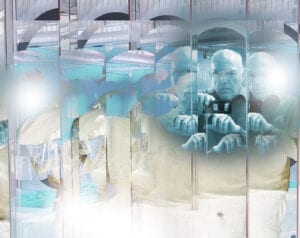Science forum hosts professor’s research below half a mile of ice
Jill Mikucki, Ph. D., assistant professor of microbiology, lectured on the impact of the interactions of microbial life in Antarctica Friday for UT’s Science Forum. Her research focused on environmental interactions of microbial life under Lake Whillans and Blood Falls in Western Antarctica and how life is able to sustain itself under extreme cold conditions.
She explained that it took the researchers 14 days to traverse 620 miles of the Antarctic landscape to reach the drill site on Lake Whillans. Once there, the research team used a sterilized high-powered water pressure drill system to make a borehole in the ice at a depth of 2,626 feet. Mikucki said that a water pressure drill was necessary because the use of a gas-powered drilled would have contaminated the samples. Her specimens showed microbial life that lives below and within the Antarctic ice by using carbon compounds to survive.
Mikucki said their research at Blood Falls was first discovered in 1911 by Griffith Taylor, an Australian researcher. Initially it was thought that red alga gave Blood Falls its signature red color, but researchers now know that it is a mixture of iron and salt that is two and a half times the salinity of sea water. Using a method known as Resistivity Mapping, researchers were able to use the electro-magnetic currents in the area to explore the features of what lay under Blood Falls so they could find an optimal location to drill. Researchers believe that the source of Blood Falls is a pocket of ancient sea water that flows to the surface and samples of this sea water allowed them to observe the microbial life that resides within the ice. Analyses has shown that such microbial life is related to marine organisms from other arctic environments that are able to take carbon, iron and sulfur compounds and convert them into nutrients for themselves and other organisms around them.
Mikucki explained that microbial life in the Antarctic is endangered. The biogeochemical cycles that help to regulate the environment could be altered, which would bring harm to the surrounding areas. Long term effects could arise, such as melting ice, which researchers have estimated could raise the sea levels around the world three to five meters, affecting coastal areas.
The UT Science Forum, presented by Quest, is held weekly at the Thompson-Boling Arena Cafe on Fridays from noon-3 p.m.
Edited by Nichole Stevens



